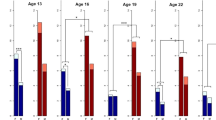Abstract
In a 2010 issue of Sex Roles and in a recent jointly authored work, Lamb and Peterson (2011) introduced and grappled with some of the most complex debates surrounding adolescent female sexuality. In response to the questions they pose regarding the constitution of young women’s sexual empowerment, this commentary revisits the fundamental principles of empowerment theory and practice. Empowerment is popularly equated with individualized concepts of self-efficacy and agency. However, collective efforts to develop critical consciousness and to address systemic bias and inequality were originally regarded as essential components of empowerment. I recall these broader, politicized aspects of empowerment as a way of advocating for: (1) a collective approach to supporting young women’s sexual well-being through intergenerational alliances and safe spaces; and (2) a more thorough analysis of how contextual factors, including non-sexual ones, shape young women’s sexual choices and lives.
Similar content being viewed by others
References
Baumeister, R. F., & Vohs, K. D. (2004). Sexual economics: Sex as female resource for social exchange in heterosexual interactions. Personality and Social Psychology Review, 8, 339–363. doi:10.1207/s15327957pspr0804_2.
Bay-Cheng, L. Y. (2010). Justifying sex: The place of women’s sexuality on a social justice agenda. Families in Society, 91, 97–103. doi:10.1606/1044-3894.3962.
Bay-Cheng, L. Y., & Fava, N. M. (2011, June). Thwarted sexual agency: Narratives from adolescent girls in the U.S. child welfare system. Poster presentation at the 20th World Congress for Sexual Health, Glasgow, Scotland.
Bay-Cheng, L. Y., & Lewis, A. E. (2006). Our “ideal girl”: Prescriptions of female adolescent sexuality in a feminist mentorship program. Affilia, 21, 71–83. doi:10.1177/0886109905283137.
Bay-Cheng, L. Y., Lewis, A. E., Stewart, A. J., & Malley, J. E. (2006). Disciplining girl talk: The paradox of empowerment in a feminist mentorship program. Journal of Human Behavior in the Social Environment, 13, 73–92. doi:10.1300/J137v13n02_05.
Bay-Cheng, L. Y., Livingston, J. A., & Fava, N. M. (2010). Adolescent girls’ assessment and management of sexual risks: Insights from focus group research. Youth & Society, 43, 1167–1193. doi:10.1177/0044118X10384475.
Bay-Cheng, L. Y., Livingston, J. A., & Fava, N. M. (in press). “Not always a clear path”: Making space for peers, adults, and complexity in adolescent girls’ sexual development. In E. L. Zurbriggen & T. Roberts (Eds.), The Sexualization of Girls and Girlhood. New York: Oxford University Press.
Checkoway, B., Richards-Schuster, K., Abdullah, S., Aragon, M., Facio, E., Figueroa, L., et al. (2003). Young people as competent citizens. Community Development Journal, 38, 298–309. doi:10.1093/cdj/bsg004.
Debold, E., Brown, L. M., Weseen, S., & Brookins, G. K. (1999). Cultivating hardiness zones for adolescent girls: A reconceptualization of resilience in relationships with caring adults. In N. G. Johnson, M. C. Roberts, & J. Worell (Eds.), Beyond appearance: A new look at adolescent girls (pp. 181–204). Washington: American Psychological Association.
DeLamater, J. D., & Hyde, J. S. (1998). Essentialism vs. social constructionism in the study of human sexuality. Journal of Sex Research, 35, 10–18. doi:10.1080/00224499809551913.
Fine, M. (1988). Sexuality, schooling, and adolescent females: The missing discourse of desire. Harvard Educational Review, 58, 29–53.
Fine, M., & McClelland, S. I. (2006). Sexuality education and desire: Still missing after all these years. Harvard Educational Review, 76, 297–338.
Fine, M., & McClelland, S. I. (2007). The politics of teen women’s sexuality: Public policy and the adolescent female body. Emory Law Journal, 56, 993–1038.
Fortenberry, J. D. (2003). Adolescent sex and the rhetoric of risk. In D. Romer (Ed.), Reducing adolescent risk: Toward an integrated approach (pp. 293–300). Thousand Oaks: Sage.
Gutiérrez, L. M. (1994). Beyond coping: An empowerment perspective on stressful life events. Journal of Sociology and Social Welfare, 21, 201–219.
Gutiérrez, L. M., DeLois, K. A., & GlenMaye, L. (1995). Understanding empowerment practice: Building on practitioner-based knowledge. Families in Society, 76, 534–542. doi:10.1606/1044-3894.1273.
Harris, A. (2005). Discourses of desire as governmentality: Young women, sexuality and the significance of safe spaces. Feminism & Psychology, 15, 39–43. doi:10.1177/0959353505049702.
Lamb, S. (2010a). Feminist ideals of healthy female adolescent sexuality: A critique. Sex Roles, 62, 294–306. doi:10.1007/s11199-009-9698-1.
Lamb, S. (2010b). Porn as a pathway to empowerment? A response to Peterson’s commentary. Sex Roles, 62, 314–317. doi:10.1007/s11199-010-9756-8.
Lamb, S., & Peterson, Z. D. (2011). Adolescent girls’ sexual empowerment: Two feminists explore the concept. Sex Roles, this issue. doi:10.1007/s11199-011-9995-3.
Lee, J. A. B. (2001). The empowerment approach to social work practice: Building the beloved community. New York: Columbia University Press.
Mohanty, C. T. (2003). “Under Western eyes” revisited: Feminist solidarity through anticapitalist struggles. Signs, 28, 499–535. doi:10.1086/342914.
Muehlenhard, C. L., & Kimes, L. A. (1999). The social construction of violence: The case of sexual and domestic violence. Personality and Social Psychology Review, 3, 234–245. doi:10.1207/s15327957pspr0303_6.
Muehlenhard, C. L., & Peterson, Z. D. (2005). Wanting and not wanting sex: The missing discourse of ambivalence. Feminism and Psychology, 15, 15–20. doi:10.1177/0959353505049698.
Pease, B. (2002). Rethinking empowerment: A postmodern reappraisal for emancipatory practice. British Journal of Social Work, 32, 135–147. doi:10.1093/bjsw/32.2.135.
Petchesky, R. P. (2000). Human rights, reproductive health and economic justice: Why they are indivisible. Reproductive Health Matters, 8, 12–17. doi:10.1016/S0968-8080(00)90001-6.
Peterson, Z. D. (2010). What is sexual empowerment? A multidimensional and process-oriented approach to adolescent girls’ sexual empowerment. Sex Roles, 62, 307–313. doi:10.1007/s11199-009-9725-2.
Rappaport, J. (1987). Terms of empowerment/exemplars of prevention: Toward a theory for community psychology. American Journal of Community Psychology, 15, 121–148. doi:10.1007/BF00919275.
Riger, S. (1993). What’s wrong with empowerment. American Journal of Community Psychology, 21, 279–292. doi:10.1007/BF00941504.
Steinberg, L. (2007). Risk taking in adolescence: New perspectives from brain and behavioral science. Current Directions in Psychological Science, 16, 55–59. doi:10.1111/j.1467-8721.2007.00475.x.
Tiefer, L. (2004). Sex is not a natural act (2nd ed.). Boulder: Westview.
Watts, R. J., & Flanagan, C. (2007). Pushing the envelope on youth civic engagement: A developmental and liberation psychology perspective. Journal of Community Psychology, 35, 779–792. doi:10.1002/jcop.20178.
Author information
Authors and Affiliations
Corresponding author
Rights and permissions
About this article
Cite this article
Bay-Cheng, L.Y. Recovering Empowerment: De-personalizing and Re-politicizing Adolescent Female Sexuality. Sex Roles 66, 713–717 (2012). https://doi.org/10.1007/s11199-011-0070-x
Published:
Issue Date:
DOI: https://doi.org/10.1007/s11199-011-0070-x




